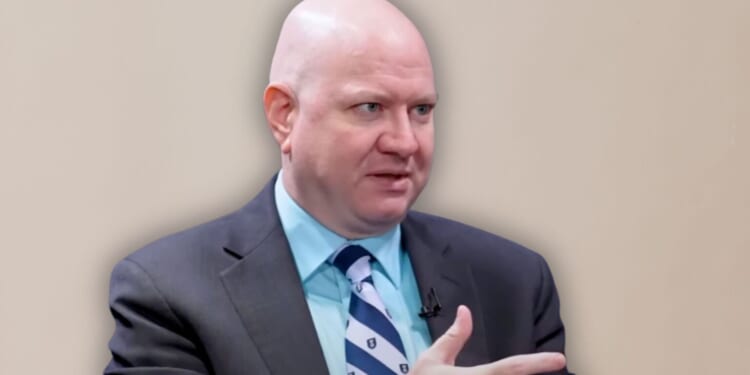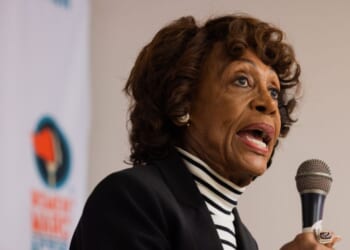What happened to the Resistance? When Donald Trump was first elected US president in 2016, it galvanised the liberal establishment and its comfortably off footsoldiers to rage against him for years on end. In 2024, all the stops were pulled out to try to block Trump’s path to re-election, from outrageous lawfare to attempting to take him off the ballot entirely in certain states.
But now that he is firmly back in the White House, things feel much more muted. The recent ‘No Kings’ protests – painting Trump as a would-be autocrat – were sizeable, but rather listless. The Democratic Party still hasn’t decided how it intends to digest its humiliating defeat last year. Has the anti-Trump hysteria abated?
Daniel McCarthy, editor of Modern Age, joined Brendan O’Neill to discuss all this and more. What follows is an edited extract from that conversation. You can watch the full thing here.
Brendan O’Neill: What did you make of the recent, anti-Trump ‘No Kings’ rallies?
Daniel McCarthy: This was a quixotic demonstration. It was a very old crowd and basically, as you say, an anti-Trump protest. It wasn’t organised around any particular issue. It wasn’t against his immigration policy. It didn’t protest against his foreign policy, or the fact that he won the last election. It was simply a protest against the fact that Donald Trump is president.
Even stranger, these protests were labelled ‘No Kings’, plural, as if Charles and any number of monarchs were the target of their ire. It really didn’t make a lot of sense. It was simply an opportunity for Boomers to leave the old-folks’ home and get some sunshine. It’s true that they did come out in large numbers, but I don’t see that there’s any real political force behind it.
O’Neill: Was it the death rattle of Trump Derangement Syndrome?
McCarthy: There’s still such a thing as Trump Derangement Syndrome. But I think what ‘No Kings’ better demonstrated was a great generational divide.
It does seem as if the older generations, especially the older generation of liberals and progressives, are having difficulty accepting the 21st century. They still want to live in the 20th century, and to believe that a number of things they took for granted – such as the sacredness of the New Deal – still pertains. They believe that Trump is an aberration who, under normal circumstances, would never have been elected.
There is, of course, the young left, which is quite militant and energised, exemplified by Zohran Mamdami, the Democratic mayor-elect in New York. But that wasn’t the demographic of No Kings. The rally was really just a fading echo of a generation remembering its glory days of protesting other conflicts, from the Iraq War to Vietnam. It was an opportunity to relive those times. That’s why it came across like a record stuck on repeat.
O’Neill: How are things looking for Trump’s opponents right now?
McCarthy: Democrats are very wrongfooted right at the moment. They can’t quite come out and reject Trump’s immigration policy completely, because of course, the idea of stopping illegal immigration is very popular with the American people. They can’t say that they’re against Trump’s trade policy, because it’s actually popular with the working class. The Democrats would find themselves in a very awkward position if they started outright saying that global imports should be favoured over America’s own industries. And it’s not like they can mobilise the masses against a war that Trump is fighting because, in fact, Trump is ending wars rather than starting them. His opponents have predicted these apocalypses again and again, and each time, they have been disproved.
I think people are realising that Trump might be on to something, regardless of what they think of his style or character. He has not only correctly identified where the American public is, but also where much of the public in Western Europe is, too, on the questions of globalisation and immigration.
O’Neill: You mentioned Trump’s trade policy. How is that panning out so far?
McCarthy: It has been very amusing to see establishment economists, who were previously predicting something like a Great Depression taking hold in America, having to backtrack. The trade policy is still in its early phases, so there’s still the initial shock of the economic and business establishments, which are grappling with what Trump is doing and trying to work out exactly how long it will last.
You also have the rest of the world gradually waking up to the fact that Trump is not bluffing. He really will slap general tariffs on everyone, and also far larger ones on anyone who he feels is getting into a tit-for-tat with him. Governments around the world are realising that they have to take this more seriously; in other words, that they have to earn a certain amount of favour with Trump. I think the new prime minister in Japan being something of a protégé of Prime Minister Abe, who, of course, had a very good rapport with President Trump, is likely an example of this.
It’s going to take time to see whether American industry really can take the opportunity it’s been offered by Trump to strengthen itself – to reinvest in American factories and American workers. Right now, the business community does feel a certain amount of uncertainty. There’s some fear that even if Trump is consistent about these policies over the next three years, you never know who’s going to take charge after 2028 and whether there will be a sudden reversion to the kind of globalism that had been pursued for decades.
More and more business leaders seem to be coming to the conclusion that there will not be a reversion – even Democrats realise that the American working class wants to see some measure of protection remain after Trump. But, as I say, it’s early days. There’s still a lot of dust still to settle before we know exactly what the long-term trajectory is going to look like.
Daniel McCarthy was talking to Brendan O’Neill. Watch the full video below:

















